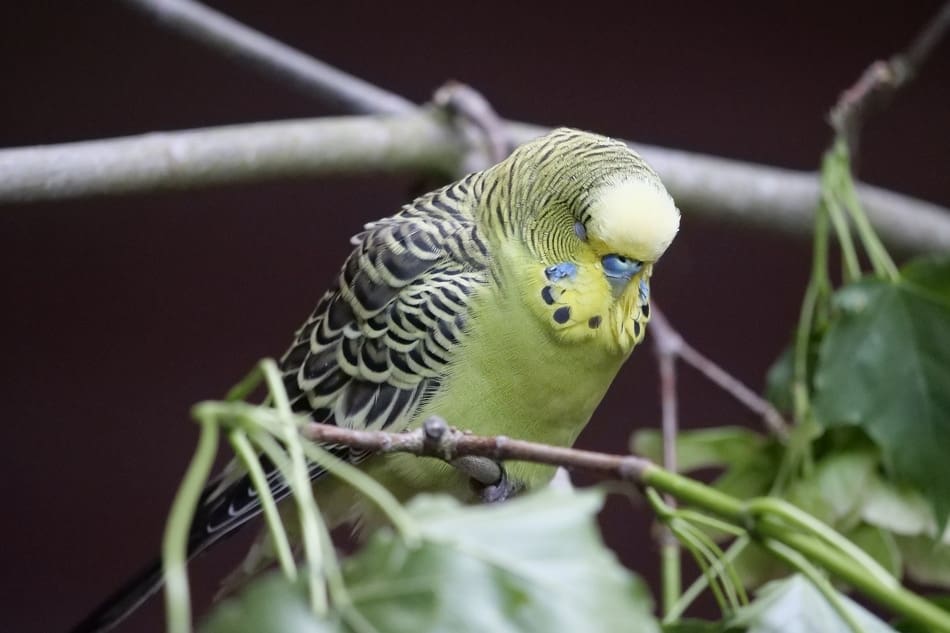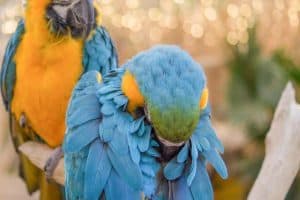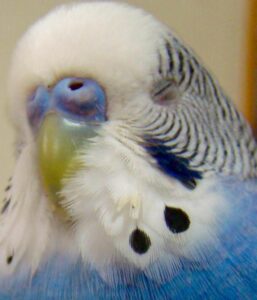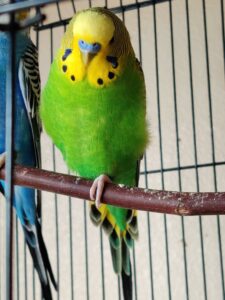Parakeets, also known as budgerigars, have sleep patterns that are quite different from humans.
They are considered to be polyphasic sleepers, which means they have multiple sleep cycles throughout a 24-hour period.
In the wild, parakeets live in areas with potential predators, so they have adapted to sleep in short bursts to stay alert to their surroundings.
On average, parakeets sleep around 10 to 12 hours a day.
However, this sleep is not continuous like human sleep.
Instead, they take short naps throughout the day and night.
These naps can last anywhere from a few seconds to several minutes.
Their sleep patterns can also be influenced by factors like their environment, the presence of light, and their overall health.
It’s important to provide a quiet and undisturbed environment for your parakeet to allow them to get the rest they need.
Additionally, covering their cage with a cloth during the night can help create a dark and peaceful space for them to sleep.
Keep in mind that individual parakeets may have variations in their sleep patterns, and it’s crucial to observe your specific bird’s behavior to understand its sleep needs better.
If you notice significant changes in their sleep habits or behavior, it’s a good idea to consult with an avian veterinarian to ensure their well-being.

How Do Parakeets Sleep?
There are various positions of a parakeet in which it likes to sleep. Commonly, you can notice these signs when your parakeet is sleeping.
1. Head Tucked

If you find your pet partner keeping his head tucked in the cage, it means that he’s tired due to the activity that he did all day.
He would be in need of great rest, which is why he is keeping his head tucked in the feathers.
2. Closed Eyes

As any living being would do, when parakeets feel sleepy or tired, they close their eyes too.
If you see your parakeet sitting with its eyes closed, it definitely means he is resting or needs to rest.
Provide him with a proper place so that he can rest a little bit to gain his active health back.
3. One Leg Up

Mostly, the parakeets sleep on one leg.
If you find your parakeet with one leg missing, don’t be afraid as they like to sleep on one of their legs while the other one is hidden under their belly in the fur.
Where Do Parakeets Sleep?
Parakeets mostly sleep on their perches or roosts that are put in their cage.
A wild parakeet would sleep on branches or in cavities as well as they would sit on perches and sleep there.
In case you are wondering where parakeets sleep as pets, then you must have a nest or hanging hammocks for them or even perches on which they can rest.
You can find lots of equipment such as beds and other things to comfort your parakeet by providing it with the suitable and necessary equipment in the cage.
Consider buying more wooden products such as perches and other stuff that would make your parakeet feel more comfortable.
In this way, it will feel more instinctive under its feet.
How Much Sleep is Good for Parakeets?
Parakeets need around 8-12 hours of rest each day.
A wild parakeet will rest from night till dawn which is almost the same schedule followed by a pet parakeet, but a pet may have fewer sleeping hours.
The best you can do for your parakeet is to keep it entertained and in the company as long as you are at home.
In case you are going to work, give him toys or something to spend his time with.
A tired parakeet won’t be much talkative, and he would be frustrated most of the time, which is why you can set a sleeping pattern for your pet parakeet to remain active for quite a while later.
Then you can let him rest during the daytime when you are at your work or out somewhere.
Keep in mind that less than 8 hours of sleep and more than 12 hours of sleep are not good for parakeets, so notice your pet’s behavior.
Why Do Parakeets Sleep During the Day?
If your parakeets are sleeping during the daytime, then there can be several reasons such as they are bored, or they didn’t have a good sleep, or even they can be tired.
Each reason is explained clearly in more detail below.
1. Parakeet is Bored
In case your parakeet has nothing to do other than spending his day in the cage playing with the toys, or if there are no toys, he would just sing and chatter all day with himself and get bored, which is why he may be feeling drowsy, and he sleeps during the day.
It would happen because parakeets are perched on the cage to spend their entire day where they have nothing else to do, which is why they are most likely to get bored quickly.
Due to all this, your parakeet may spend most of the time sleeping during the day.
2. Parakeet is Tired
Tiredness leads to drowsiness and causes a parakeet to sleep.
If your parakeet gets exhausted after the activity during the day or night and starts to feel lethargic, he must be tired and would sleep during the day too.
He may be flying too much or chattering a lot, or maybe playing with the toys, which is why he gets tired and sleeps during the day too.
3. Night Environment
Parakeets can’t sleep at night if the night environment is noisy or their nighttime is disturbed.
You can’t just cover the birdcage with blinders so that birds may sleep; they can also get disturbed by your chatters or voices from any other room, which is why they would sleep during the daytime to complete their sleep time.
Conclusion
In conclusion, understanding the sleep patterns of parakeets provides valuable insights into the unique behaviors and adaptations of these captivating birds.
Unlike humans with consolidated sleep, parakeets are polyphasic sleepers, experiencing multiple short sleep cycles throughout the day and night.
Their natural tendencies to take brief naps help them stay vigilant in the wild, where potential threats loom.
On average, parakeets sleep around 10 to 12 hours a day, but this sleep is characterized by intermittent rest rather than prolonged periods of slumber.
As responsible pet owners, it is essential to provide a calm and uninterrupted sleep environment for our feathered companions.
By acknowledging and respecting their sleep needs, we contribute to their overall well-being and allow them to flourish in captivity as well as in their natural habitats.
FAQ
Do parakeets sleep during the night or day?
Parakeets don’t have a distinct day-night sleep schedule like humans. They can take short naps both during the day and night. In their natural habitat, parakeets remain alert to potential predators, so their sleep patterns are designed to help them stay vigilant.
Why do parakeets take short naps instead of sleeping all at once?
Parakeets’ short naps are an adaptation to their environment. In the wild, they live in areas where predators are a threat. By taking short naps, parakeets can quickly awaken and react to any potential danger, ensuring their survival.
Is it normal for my parakeet to sleep with its eyes open?
Yes, it’s normal for parakeets to sleep with one eye open. This behavior, known as unihemispheric slow-wave sleep, allows one hemisphere of the brain to rest while the other remains alert to its surroundings. It’s a survival mechanism that helps them stay safe in the wild.
How can I create a suitable sleep environment for my parakeet?
To provide a conducive sleep environment for your parakeet, place their cage in a quiet, dimly lit area. Cover the cage with a cloth or cage cover during the night to ensure darkness and minimize disturbances. This will help your parakeet get the rest they need.
Do parakeets need complete darkness to sleep?
While complete darkness is not always necessary, providing a relatively dark and quiet environment can help parakeets sleep better. Covering their cage during the night helps create a sense of security and can aid in regulating their sleep patterns.
Last Updated on August 21, 2023 by Lily Aldrin
